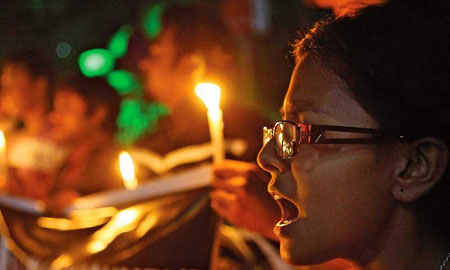New Delhi, Dec 20: The juvenile offender of the horrific December 16 gangrape case is all set to walk free on Sunday as the Supreme Court refused the dramatic post-midnight move of the Delhi Commission for Women (DCW) to stay his release by giving an urgent hearing.

However, DCW chairperson Swati Maliwal and the lawyers of the women's panel hoped that since the matter has become sub judice, the government and Delhi Police will not release the juvenile offender.
"The matter has been posted for hearing on Monday as item number 3. The matter has now become sub judice. I hope that government and the Delhi Police will wait for one day and not release him," Maliwal told reporters outside the residence of Justice Goel.
The Special Leave Petition filed by DCW against the order of the Delhi High Court, which refused to restrain the release of the convict, was referred by the Chief Justice of India TS Thakur before the vacation bench.
Lawyers associated with the case, including senior advocate Guru Krishna Kumar and Devdutt Kamath, had rushed to Justice Goel's residence at around 1.30 am after Maliwal was told by the Registrar that the matter has been assigned to the vacation bench.
"CJI had refferred matter to Vacation Bench. Registrar General taken our case to Judge. On our way dere. Appeal for case to be heard tonight," Maliwal had tweeted earlier. The grounds which has been taken in the appeal against the High Court order says that no mental assessment of the state of mind of the juvenile offender has been taken into account for his release.
Advocate Kamath said that there are intelligence reports that even during his stay in the provision home, the convict was unremorseful of his action and he has been further radicalised. So at this stage, it cannot be said that he is not a threat to the society.
The SLP has also stated that though the High Court was of the view that there was a need for mental assessment of the convict, there was no direction that before his release the authorities should go for a health and mental assessment of the offender.
Further, it is submitted in the petition that there is also likely to be threat to his own life as reports are appearing that there is anger and tension between two groups in his own village. "Therefore it is also in his own interest and for the protection of his life that he should not be dumped and left unprotected," it said.
In the petition, Kamath said there are other legal points raised to challenge the High Court order. Guru Krishna Kumar is to appear for DCW in the case. The High Court had yesterday refused to restrain the convict's release citing that there is no legal provision for the action.
Maliwal reached the Chief Justice of India's residence around midnight and later arrived at the Registrar's office in the apex court premises. A day before his scheduled release, the juvenile convict was moved out of Delhi today even as distraught parents of the victim were detained today after they held a protest against allowing him to walk free.
The convict, who is now 20 years old and was known to be the most brutal of the attackers, has been taken to an undisclosed location from a correction home in North Delhi amid concerns that there was a threat to his life.
Sources said the juvenile has been kept under observation of an NGO under the protection of Delhi Police. The parents of the gangrape victim, along with 40 Delhi University and Jawaharlal Nehru University(JNU) students, were detained by the police as they staged a protest against the release of the juvenile convict. The police action was condemned by Delhi Chief Minister Arvind Kejriwal.
"I am shocked to learn that Nirbhaya's parents have been detained. They shud immediately be released. Police action against Nirbhaya's parents is unacceptable. I have asked Chief Secretary to talk to Police Commissioner and get them released," Kejriwal tweeted.





Comments
Thoughtful commentary , For what it's worth , you are looking for a PA PUB 12 , my business partner saw a blank form here
Add new comment